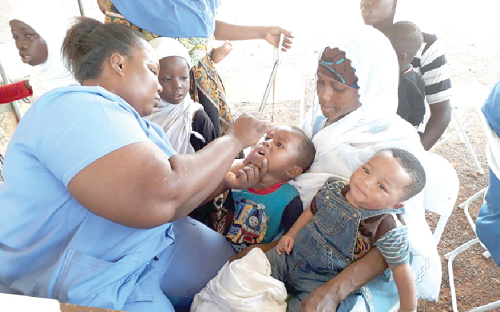
Promoting immunisation in the midst of COVID-19
Globally, immunisation saves millions of lives every year. It is considered as one of the world’s most successful and cost-effective health interventions.
However, according to the World Health Organisation (WHO), there were still nearly 20 million children in the world today who were not getting the vaccines they needed.
Advertisement
Considering the enormous importance of immunisation, the WHO instituted the World Immunisation Week (WIW), which is celebrated in the last week of April each year to promote the use of vaccines to protect people of all ages against diseases. This year's theme was ‘Vaccines Work for All’.
The main aim of the WIW campaign is to urge greater engagement around immunisation globally and the importance of vaccination in improving health and wellbeing of everyone everywhere.
Immune system
Immunisation protects children against many diseases, including diphtheria, tetanus, chicken pox, measles, polio, pneumonia, rotavirus diarrhea, hepatitis and seasonal flu by making their immune system strong and free from contracting any disease they come into contact with.
It is estimated that when children are vaccinated, it helps to prevent between two to three million deaths every year from killer diseases.
But many misconceptions around immunisation are greatly affecting global efforts in reaching every child everywhere with the needed immunisation or vaccination.
Misconceptions
Some parents out of fear due to misconceptions about immunisation deliberately deny their children the opportunity to get immunised.
Aside this, the lack of health practitioners, logistics, and insufficient funding from the governments seem to be affecting the efficiency and effectiveness of immunisation in developing countries.
For instance, in 2019, a few weeks after Ghana had celebrated 10 years of polio free, the country recorded some cases of polio in northern Ghana.
COVID-19
With the emergence of the novel coronavirus pandemic (COVID-19), which has brought the world to its knees, many activities, including the regular immunisation treks by health personnel have either been limited or stopped for fears of personnel in such exercises contracting the deadly virus.
Some parents are also scared to send their children for immunisation and vaccination in this time, because they fear that in exposing their children to strangers, they might contract the coronavirus.
However as the nation fights the coronavirus, it must not lose focus on the immunisation of children who must be protected against childhood killer diseases.
This is because there is a higher risk of activating a revival of diseases such as measles, polio and meningitis if we stop immunising and vaccinating our children during this coronavirus period.
The writer is a student journalist at the Ghana Institute of Journalism.



